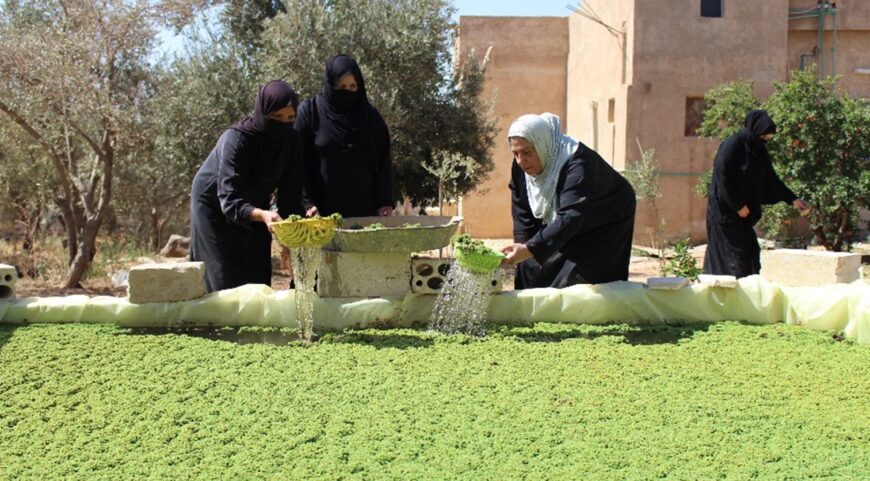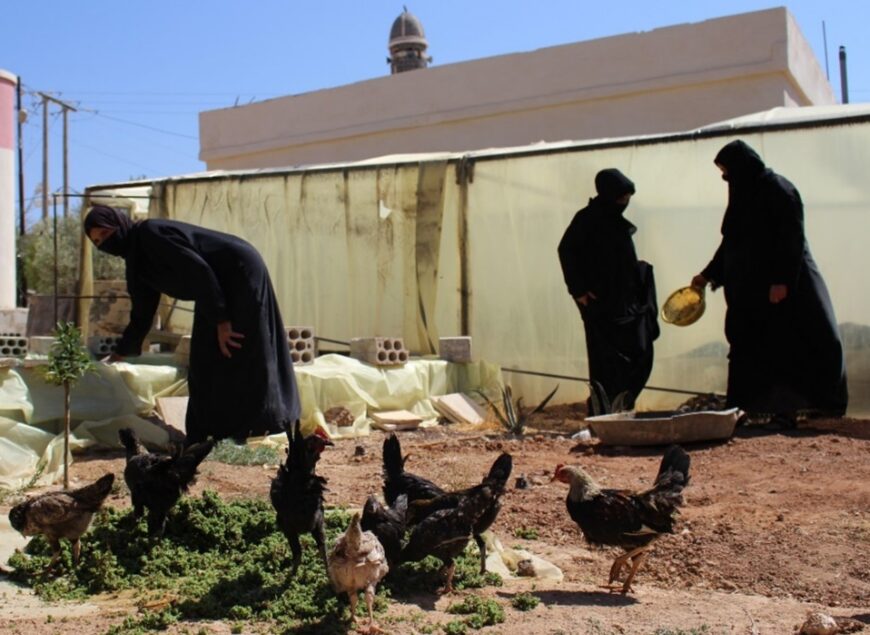In Jordan water supplies are becoming scarcer and scarcer, ACTED is fostering innovative, cost-saving agricultural practices to help vulnerable Jordanian and Syrian-refugee women increase their access to economic opportunities and become self-supporting.
Azolla is a very small, 1 to 2 centimetres wide, plant that grows by simply floating on the surface of water. It can be cultivated in artificial water basins and hydroponics beds in greenhouses and thus can be produced during winter in Jordan. Azolla is a highly productive plant as it can double its mass in 3 to 10 days.
Jordan is the second most water scarce country in the world. Jordan’s annual renewable water resources are less than 100 m3 per person, significantly below the threshold of 500 m3 per person which defines severe water scarcity.
ACTED supported 17 women through 4 women-led agricultural businesses, based in Mafraq and Balqa governorates, to strengthen their economic potential through the production of azolla with the financial support from BPRM. This enabled women to reduce monthly input and operational costs and strengthen the sustainability of year-round income streams, while also adopting more climate-smart and water resilient agricultural techniques.
Why promote azolla farming in Jordan?
Agriculture is a key sector for employment in Jordan, as an estimated 25% of the population, particularly Syrian refugees, depend on it as a source of livelihood. However, financial sustainability and growth of agricultural workers is inhibited by limited technical capacities and scarcity of water resources, which are expected to further deteriorate in the coming years. The agricultural sector withdraws 65% of Jordan’s freshwater resources.
To address the constraints of Jordan’s ecosystem and the economic challenges faced within the agricultural sector, ACTED supported four women-led microbusinesses to improve their technical capacity and introduce azolla cultivation. Azolla, a vivid green free floating aquatic fern, is both economically and environmentally advantageous as it allows water re-use and can be harvested on a daily basis in small artificial water basins. On average, one square meter can produce around 2 kilograms of azolla.

With the azolla production process, water is largely recycled, with only 20-30% of the water replaced every 10-14 days.
ACTED supported four women-led agricultural microbusinesses
ACTED provided the microbusinesses with seeds trainings on growing techniques, including the introduction of low-tech hydroponic systems, and continued coaching throughout the project to mitigate any challenge they might face. Moreover, women’s labour force participation in Jordan is amongst the lowest in the world while nearly two-thirds of unemployed women would like to work. This is why ACTED prioritized the inclusion of women through azolla farming.
Azolla calls for minimal resources as it does not require any additional cost other than the acquisition of the water pond. Moreover, the production process is not technically challenging nor demands for extensive maintenance. All 17 female farmers found it easy to launch production and are using azolla as a natural fertilizer or an alternate feed supplement for livestock.
What are the benefits of Azolla farming ?
The introduction of azolla cultivation into these communities has had significant economic, environmental, and social benefits. Some of the businesses have now started to sell azolla surplus to local farmers, thus providing them access to a new source of income. Female farmers report that azolla farming has helped them raise chickens at lower costs by reducing the monthly livestock feeding expenses by 80% to 90%.
After witnessing the financial benefits from azolla production, these female farmers have already begun to spread their knowledge and teach their friends and neighbours on how to replicate this approach.

Nadia has found the launch of azolla farming easy thanks to ACTED’s assistance and considers this new practice a way to ensure sustainable livelihoods for her family. She says that “Azolla is a cheap feed material for animals, it is easy to work with and provides new job opportunities. It is not expensive and can lead to a profitable business”.
Thanks to ACTED’s intervention, Afaf got introduced to azolla farming and recognized its economic potential within the strained Jordan agricultural ecosystem. He says that “Azolla is a new agricultural crop that did not previously exist in the area. It is easy and profitable with low production costs… if it continues to grow in popularity [amongst farmers] in the area, it will be very profitable”.